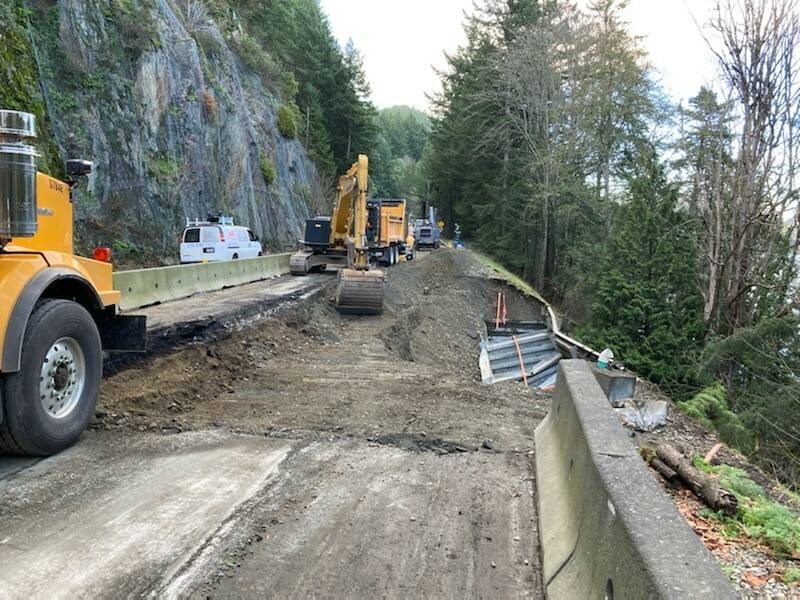The Malahat between West Shore Parkway and Tunnel Hill will be fully closed nightly from 6 p.m. to 6 a.m. until Monday to allow crews to repair extensive damage caused by heavy rain and flooding.
The closures began with a 7 p.m. to 6 a.m. shutdown overnight Tuesday. The highway was also closed between West Shore Parkway and South Shawnigan Lake Road overnight Monday.
Single-lane alternating traffic, which started Tuesday morning, will be allowed at other times. Traffic will alternate going north and south at 30-minute intervals
Huge volumes of water that crossed the Malahat at Tunnel Hill, north of Finlayson Arm Road, has caused road and bank instability.
Janelle Staite, South Coast representative for the Ministry of Transportation, said problems arose when debris from the rock face started to plug the culverts that typically carry water under the road.
“So given the volume of water, the magnitude of it, it chose the path of least resistance, which was somewhat under the highway and somewhat over the highway.”
Removal of three segments of roadside barrier allowed some of the water to flush away under the median via “scuppers,” or large drainage holes, she said.
Staite said the ministry continues to advise that only essential traffic use the Malahat for now. “We really want to focus on folks that have to be there as opposed to anything else.”
Aside from the Brentwood Bay-Mill Bay ferry, the only alternative is the Pacific Marine Circle Route, which connects Victoria to Duncan via Sooke, Port Renfrew and Lake Cowichan.
News of the overnight Malahat closures left commercial transportation companies scrambling.
That included ColdStar Solutions, a Langford-based grocery wholesaler and trucking company that hauls food to stores up and down Vancouver Island. CEO Kelly Hawes said the average consumer shouldn’t notice a difference, but moving food will be a challenge. ColdStar usually does most of its shipping at night, but will now be vying for road space with congested daytime traffic.
“It would help if people who don’t have to be on the Malahat don’t travel, so that the people who do have to travel aren’t in lineups longer than they need to be,” said Hawes, adding the closures show the need for an alternative to the Malahat.
Also trying to adapt is Al Hasham, CEO of Victoria’s Maximum Express Courier, Freight and Logistics. The company offers a service where it stores equipment for clients — banks, medical-supply companies and gas stations, for example — that can be rushed to their customers and affiliates on short notice.
“We do a lot of emergency shipments for companies back east,” he said.
Not only are night runs up-Island not possible right now, but on Tuesday, drivers faced a two-hour delay during the day. Hasham said he was told that if he was not in line to cross the Malahat at 4:30 p.m. Tuesday, he would not make the 7 p.m. cut-off.
As for medical emergencies, B.C. Emergency Health Services said a Parksville-based helicopter is available should patients need to cross the Malahat.
Retired transportation consultant Chris Foord said the situation underlines the need for an emergency-bypass route to circumvent the Malahat.
“It’s mostly if it’s a crash that’s causing a closure,” he said. “This is a little different — this compromised the ability of the road to carry traffic.
“The only way to avoid a recurrence of this would be to change our climate or build a completely new alignment.”
He said an “unbelievable” amount of water was generated by the storm. “You dump six inches of rain on every square foot of southern Vancouver Island, then water coming down Tunnel Hill — the southbound lane would be just like a white-water river.”
The Malahat is inadequate to serve approximately 400,000 people in the capital region, Foord said, particularly with a single lane on its approaches.
“What it comes down to is not our inability to build a proper road over the Malahat, it’s our unwillingness to do so.”
Foord said there is never a bad time to take a closer look at the highway.
“And looking at it sooner is better than looking at it later.”



